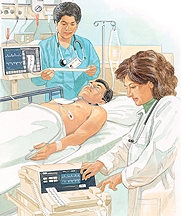Cardioversion
Cardioversion is a procedure to restore the heart’s normal rhythm. You may have the procedure in a hospital or surgery center. It’s often done on an outpatient (same day) basis. During the procedure, you’ll be given medication to keep you free from pain. Then the doctor gives you a brief electric shock. This helps your heartbeat become normal again. In most cases, you can go home the same day as the procedure.

Before Your Procedure
- Tell your doctor what over-the-counter and prescription medications, herbs, and supplements you are taking.
- Take medication as directed. Your doctor may prescribe anticoagulants (blood thinners) for a few weeks. They help prevent blood clots from forming.
- Ask your doctor about the risks and benefits of cardioversion.
- Sign your consent form.
- Don’t eat or drink anything for 8 hours before your procedure.
- Follow any other instructions you are given.
- Arrange for an adult to drive you home after the procedure.
During Your Procedure
- Small pads (electrodes) are placed on your chest to record your heartbeat at all times.
- An intravenous (IV) line is placed in your arm. This gives you medication (sedation) that keeps you free of pain. You’ll feel sleepy.
- You will be given oxygen through a soft plastic tube in your nose.
- Pads will be placed on your chest and back. A very brief electric shock is given through the pads. Remember, because of sedation you won’t feel the shock.
- Your heartbeat is watched to make sure the normal rhythm has been restored.
After Your Procedure
- You’ll be monitored until you are fully awake. Then you’ll be able to sit up, walk, and eat.
- In most cases, you’ll be able to go home after the sedation wears off. This usually takes a few hours.
- For a day, the skin on your chest may feel a little sore, like a mild sunburn.
- Don’t drive or operate heavy machinery for 24 hours after the procedure.
- The day after your procedure, try to take it easy. Take medication as directed.
- Call your doctor if you notice skipped beats, a rapid heartbeat, or chest tightness. These may be signs that an irregular heartbeat has returned.

